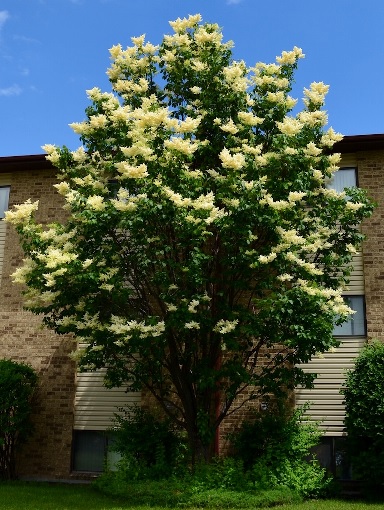Summer Flare® Japanese Tree Lilac - Syringa reticulata 'SumDak' (RFM-78)
Description

A tall, upright Japanese tree lilac growing in a nontypical form for the species. The stiffly ascending branches above a substantial trunk combine to create a tree lilac much narrower in form and greater in height than cultivars or seedling grown plants
generally found in the landscape. Large creamy white flower panicles in late June, good foliage quality, and prominent bark lenticels add to its ornamental features.
Hardiness
USDA hardiness zones 3 - 6
Mature Size
Height: 30 - 35'; Spread: 14 - 16'
Form (Shape)
Narrowly oval to upright
Growth Rate
Medium
Foliage
- Summer: Bright green
- Autumn: Insignificant
Texture
Medium
Flower
Large terminally borne panicles, creamy white in color and consisting of many small perfect, fragrant flowers. Flowering occurs in late June after foliage formation and persists for several weeks.
Fruit
Tan capsules in large panicles that persist through winter adding to seasonal interest
Light Preferences
Full sun
Soil Preferences
Moderately drought tolerant, prefers moist well-drained soil. Soil adaptable even to alkaline soils. Will tolerate dry soils once established. Intolerant of wet and flooded soils.
Propagation
Budding and grafting, cuttings and tissue culture
Ornamental Attributes
The desirable upright growth form, showy flowers, summer foliage quality, and bronze gray bark create an attractive large Japanese tree lilac for urban planting
Landscape Attributes
Recommended for use as a boulevard, landscape, public grounds, parks, schools, and golf course tree where a large tree form Japanese tree lilac can be used to diversify tree species use
Comments
Consideration can be given in street side plantings as an upright, stress tolerant tree for urban planting
Patent Status
U.S. Trademark registered – Summer Flare®
Licensing Status
This cultivar is available for non-exclusive licensing
Availability
Not available commercially yet
Downloads
Download the PDF Datasheet (PDF, 320.93 KB)
Inquire about this technology >